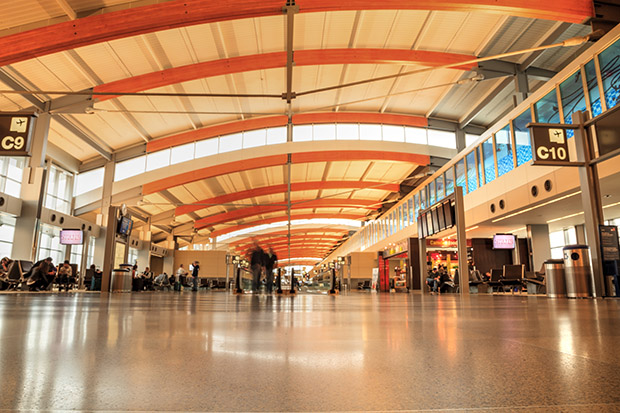On Monday, August 15, 2021, the world watched as the Taliban officially captured Kabul. That day was the culmination of their sweeping takeover of Afghanistan. Almost overnight, countless Afghans feared for their lives under the new regime. In the weeks that followed, a massive humanitarian airlift evacuated tens of thousands of Afghans to third countries and eventually to the United States.
Tomorrow, February 15, marks six months since Kabul fell. Afghans have arrived in communities across the United States to start new lives in safety and strengthen our neighborhoods and economies. About 250 of these new neighbors have arrived through CWS in Durham, North Carolina.

Raleigh Durham International Airport. New arrivals in Durham arrive at the airport. Most come by plane, but many recent Afghan arrivals come via bus or car and are met outside the airport.
A New Arrival’s First Few Weeks
When new clients arrive, CWS staff and volunteers pick them up from the airport. This is true for all of our refugee clients, including new Afghan arrivals. One difference is that many Afghans arrive by car or bus instead of airplane, since they are coming from military bases within the United States. Regardless, our team and volunteers are there to welcome them home.
A case manager and interpreter take the family or individual to their new home. After a quick tour, they show them the warm meal that has been prepared to welcome them home. Our team gives the family a cell phone and makes sure they know how to contact CWS if they need anything.
The next day, our team returns for their first home visit. Lydia Zakel, one of our case managers, says that during this visit she finds out how their first night went and reviews basic home safety tips. Then she goes over the Afghan Placement and Assistance program with the family. She walks them through what to expect over the 90-day program and what services will be offered. She makes sure they know that she will go with them for key appointments such as getting their state ID or bank accounts. She also makes sure they understand what is expected in terms of joining online English classes on the laptop provided to them and attending cultural orientation classes. Lydia makes sure the family knows when future home visits will happen (30 and 90 days later) and how to contact CWS.
Usually Lydia sees the clients again before their official 30-day home visit. This often happens because she will drop off food stamps and a Medicaid card. She checks in with them during those visits. Previously, it was easy to check in on clients weekly and drive them to things like urgent care. However, in a four month period between October 2021 and January 2022, the Durham team welcomed as many new arrivals as it normally would in a full year because of the scale of the evacuation from Kabul. With so many cases, it has been too difficult for Lydia to be everywhere at once. She relies on Uber, Lyft and volunteers to help clients to their appointments.
Settling In
During the 90 days that they work with CWS, new arrivals attend cultural orientation classes. Case manager Lauren Perkins explained that anything and everything is covered during cultural orientation. Our team and guest speakers talk about tons of topics to help new arrivals feel more at home in their new community. This can include everything from hygiene to how to call 9-1-1 in the event of an emergency to preparing for hurricanes to how to ride the bus. Lauren said that clients are required to go to three cultural orientation sessions, but many of their clients are voluntarily still going months later. These new arrivals are eager to settle in and thrive and are soaking up as much information as they can.
Lydia says that clients are also eager to get on their feet financially. “Every client has been excited to start working and contributing to the U.S. economy,” she said. “One of the questions on our cultural orientation exam is, ‘What happens if you don’t pay your rent?’ Every single one of my clients has said, ‘That will never happen. I will work as hard as I need to to pay my rent and house my family.’ There is a strong determination among my clients to get up on their feet and start working here. I see it across all of them.”
Unique Challenges
The evacuation from Kabul was extremely sudden. “I’ve heard clients say that when their house was bombed, that’s when they decided to leave. I just can’t put myself in that mindset of that trauma that exists,” Lydia says. Many families left abruptly and without the important documents that make resettling in the United States easier. This has been a formidable challenge for our team and clients. One area where we see this is school enrollment. It can be nearly impossible to get a student enrolled in the correct grade without transcripts.
“Honestly, the biggest challenge has been the frenetic pace of the evacuation and subsequent processing. It has meant that every single case has a new and individualistic and terribly complicated document situation,” Lauren says. They added, “People are ready to be in their home, to have their jobs, to go to school. It has been a challenge because we’re receiving so many people and our housing market can’t support the influx of this many folks at once. We’ve had people in temporary housing for longer than anyone wants them to be.”
How to Help
Volunteers and donors are helping offer a warm welcome to our new neighbors. To find volunteer opportunities and donation needs, please visit cwsglobal.org/help-afghans.

